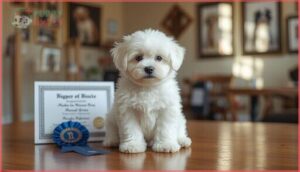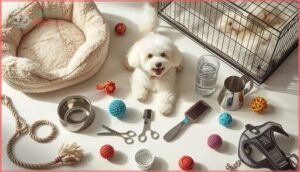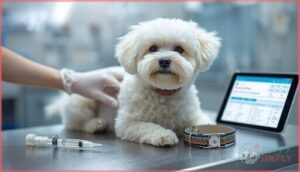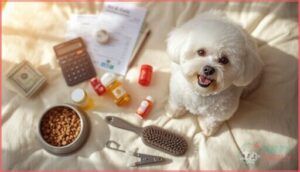This site is supported by our readers. We may earn a commission, at no cost to you, if you purchase through links.
You’ve fallen in love with those fluffy white clouds on four legs, and now you’re wondering what kind of financial commitment comes with a Bichon Frise. The price tag isn’t as simple as you might expect—these cheerful companions can range from $150 at a shelter to upward of $3,500 from a premium breeder, and that’s before you’ve bought a single chew toy.
Between the initial purchase, essential supplies, vet visits, and that signature grooming they’re famous for, costs add up faster than you can say “hypoallergenic.” Understanding the full financial picture helps you avoid sticker shock and ensures you’re ready to provide the best life for your new furry friend without breaking the bank.
Table Of Contents
- Key Takeaways
- How Much Does a Bichon Frise Cost?
- What Factors Affect Bichon Frise Pricing?
- Initial Expenses When Bringing Home a Bichon Frise
- Ongoing Annual Costs of Bichon Frise Ownership
- Tips to Manage and Reduce Bichon Frise Expenses
- Frequently Asked Questions (FAQs)
- What is the best way to socialize a Bichon Frise puppy?
- How often should a Bichon Frise be groomed?
- What is the lifespan of a Bichon Frise?
- How much exercise does a Bichon Frise need daily?
- Do Bichon Frises get along with other pets?
- How often do Bichon Frises need exercise daily?
- Are Bichon Frises good for apartment living?
- What are common behavioral issues in Bichon Frises?
- How much does traveling with a Bichon cost?
- Conclusion
Key Takeaways
- Bichon Frise prices range dramatically from $150 at shelters to $3,500+ from premium breeders, with adoption offering immediate medical care included while breeders provide health guarantees and pedigree documentation.
- Annual ownership costs stack up quickly beyond the purchase price, with professional grooming alone running $480-$1,200 yearly plus food ($300-$840), routine vet care ($200-$600), and unexpected emergencies requiring $3,000-$4,000 in reserves.
- Health certifications like OFA hip evaluations and genetic screenings drive up initial costs but protect your long-term investment by catching hereditary issues early, while champion bloodlines can push prices into the $2,000-$4,000 range.
- You can slash expenses substantially through DIY grooming (saving up to $300 annually), bulk supply purchases during sales, higher insurance deductibles, and early policy enrollment to avoid pre-existing condition exclusions.
How Much Does a Bichon Frise Cost?
If you’re thinking about bringing home one of these fluffy, cheerful companions, you’ll want to know what you’re getting into financially. The price tag on a Bichon Frise varies widely depending on where you get your dog, and understanding these differences helps you plan your budget and make the right choice for your situation.
Once you’ve settled on a budget, you’ll also want to factor in ongoing costs like grooming—check out the best dog groomers in your area to find quality care that fits your wallet.
Let’s break down what you can expect to pay whether you’re going through a breeder, a rescue organization, or a shelter.
If you’re curious about the full price breakdown—including upfront and ongoing costs—check out this complete guide to Cavapoo pricing.
Average Puppy Prices From Breeders
You’ll generally pay between $1,500 and $2,500 for a Bichon Frise puppy from reputable breeders who invest in health testing and proper care. However, breeder costs can range from $1,000 to $3,500 across the United States, with some high-end litters reaching $4,500 or more for show-quality puppies.
Beyond the upfront cost, prospective owners should also consider whether Bichon Frise barking tendencies might require training investments, as vocal habits can vary significantly between individual dogs.
Lower puppy costs around $500 to $600 often come with fewer health guarantees. For a helpful overview of monthly and one-time expenses, check out these.
A detailed breakdown of what to expect financially is available in this Pitbull Chihuahua mix cost guide, covering everything from initial purchase to yearly care.
Adoption and Rescue Fees
Adopting a Bichon Frise from rescue organizations or shelters costs considerably less, usually ranging from $150 to $500. These adoption fees cover essential care your new companion has already received:
- Spay or neuter surgery and microchipping
- Current vaccinations including rabies and distemper
- Initial health screenings and deworming treatments
Adoption costs support ongoing rescue operations, helping more dogs find loving homes while giving you a budget-friendly path to pet ownership. Adoption fees also contribute directly to, ensuring each dog receives critical medical attention before adoption.
Cost Comparison: Breeder Vs. Shelter
When weighing your options, breeder costs start around $1,200 to $3,500 and include documented health testing, while adoption fees from shelters run $150 to $600 with immediate medical care included.
Breeders offer purchase agreements with health guarantees and pedigree documentation, but pet adoption through shelters provides instant availability plus spay/neuter services.
Both paths lead to similar ongoing ownership expenses once your Bichon arrives home.
What Factors Affect Bichon Frise Pricing?
You might assume all Bichon Frise puppies cost the same, but prices can swing wildly based on several key factors. Whether you’re looking at a $1,000 pup or a $4,000 show-quality dog, understanding what drives these differences helps you make a smarter choice.
Here’s what breeders consider when setting their prices.
Health Status and Certifications
You’ll often pay more for a Bichon with documented health testing, and for good reason. Responsible breeders invest in core health screenings like hip evaluations, patella exams, and annual eye checks to catch hereditary cataracts and other canine health issues early. Look for these certifications when comparing prices:
- OFA hip and patella evaluations
- Board-certified ophthalmologist eye exams
- CHIC program certification
- Genetic screening panels
- Optional cardiac and liver shunt tests
These veterinary checks and breed standards protect your investment and your pup’s future well-being.
Understanding the full cost breakdown of owning a Shih Tzu—from initial vet visits to ongoing training—helps you budget wisely from day one.
Age and Gender
Age plays a bigger role than gender in most pricing decisions. Eight-week-old puppies command top dollar—often $1,500 to $3,500—because buyers want the full puppy development experience, while young adults past that adorable stage may drop a few hundred dollars in price.
Senior care demands higher annual costs for veterinary care and medications, but older Bichons usually have lower adoption fees, sometimes just $50 to $500, making them budget-friendly up front despite increased dog care costs down the road.
Pedigree, Bloodline, and Coat Color
Champion lines lift the price of a Bichon Frise into the $2,000 to $4,000 range when pedigree analysis reveals multiple show titles and bloodline testing confirms health across generations. Pedigree matters more than color genetics for most buyers focused on temperament and longevity.
Coat variations—white with light cream or apricot shading—follow breed characteristics outlined in standards, while excessive color drops the cost.
Breeder Reputation and Location
Breeder reputation hinges on facility transparency, so you’ll find established Bichon Frise breeders encouraging tours, posting health records, and answering questions without pressure tactics. Location factors like local regulations, kennel licensing, and proximity to veterinary partners signal professionalism.
Reputation checks through breed clubs and client references separate ethical operations from rushed puppy mills, with transparent breeders often charging premium prices that reflect their commitment to healthy, well-socialized Bichon Frise puppies.
Initial Expenses When Bringing Home a Bichon Frise
Before you even bring your Bichon Frise home, you’ll need to budget for several one-time expenses that go beyond the purchase or adoption fee.
These initial costs can add up quickly, ranging from $495 to $2,470 depending on what you already have and what quality level you choose.
Let’s break down the essential expenses you can expect in those first few weeks.
Essential Supplies and Equipment
You’ll need to stock up on grooming essentials like steel scissors and a deshedding tool, plus dog food bowls, water containers, and measuring scoops for accurate portions.
Don’t forget toys, beds, and crates to create a safe space, along with training aids like clickers and treat pouches.
Pet accessories such as dog harnesses with reflective trim and ID tags complete your starter kit.
First-Time Veterinary Care
Your first vet visit is the foundation for your pup’s long-term pet health, generally costing $100 to $350 for the initial exam, vaccine shots, and parasite control.
Most clinics schedule puppy exams around 8 to 10 weeks of age, kicking off vaccine schedules with core shots and health screens.
Budget extra initial expenses for deworming, fecal tests, and emergency funds to cover unexpected veterinary care needs.
Microchipping and Identification
Microchipping your Bichon adds another layer of security to dog ownership, running $25 to $60 for the chip and implantation at your vet, with chip registration fees ranging from $15 to $30 one-time or about $20 annually. Budget these pet expenses alongside:
- ISO-standard microchip – A tiny grain-of-rice device that meets international pet identification standards for travel
- Database registration – Links your contact info to the chip number for lost pet recovery
- Backup ID tags – Visible collar tags with your phone number, since microchips require scanners
Training and Socialization Costs
Beyond ID tags and chips, you’ll want to invest in Training Methods and Socialization Techniques that set your pup up for success.
Group Obedience Classes run $100 to $200 for a 4–6 week program, while private Puppy Coaching sessions cost $60 to $120 per hour.
Behavioral Training adds to canine expenses, but early investment in dog training classes reduces future dog ownership headaches and creates a well-adjusted companion.
Ongoing Annual Costs of Bichon Frise Ownership
After you bring your Bichon Frise home, the real expenses kick in—and they add up year after year. You’ll need to budget for everything from kibble and vet visits to those fluffy haircuts that keep your pup looking like a cloud.
Here’s what you can expect to spend annually on the essentials.
Food and Nutrition Expenses
Your bichon frise’s food costs usually run $25 to $70 per month, depending on the brand and portion sizes you choose. Most dogs need about 1 to 1.5 cups of high-quality kibble daily, which translates to 250 to 350 calories.
Specialty diets for allergies or sensitive stomachs can bump costs up by 15 to 30 percent, while treats for training add another $5 to $15 monthly.
Grooming and Maintenance Costs
While you’re covering food expenses, grooming and maintenance often become the priciest surprise for new owners. Professional pet grooming runs $40 to $80 every 4 to 6 weeks, totaling $480 to $1,200 yearly.
Grooming essentials include:
- Slicker brushes and combs ($15 to $40)
- Pet-safe shampoos for white coats ($6 to $15 per bottle)
- Nail clippers and ear cleaning solution ($5 to $20)
- Professional salon costs with seasonal variations
- Optional home grooming tools ($100 to $500)
Daily coat maintenance prevents matting and reduces salon costs markedly.
Routine Veterinary Care
Regular vet visits keep your Bichon healthy and catch problems early. Budget $200 to $600 annually for check-ups, vaccination schedules, dental exams, and parasite control. Health screenings like blood work may cost extra as your pup ages.
Emergency care can spike veterinary bills unexpectedly, so factor in $500 to $1,000 for urgent situations. Preventive veterinary care now saves you from massive expenses later.
Pet Insurance Options
Pet insurance options give you peace of mind when veterinary bills hit hard. Extensive plans cover accidents, illnesses, and most vet bills, while accident-only policies handle injuries like broken bones.
Compare insurance quotes, coverage limits, and deductible options before choosing. Wellness riders add routine care like vaccines and dental cleanings.
Understanding the claim process and policy comparison helps you pick pet health insurance that fits your budget.
Toys, Treats, and Miscellaneous Items
You’ll spend $25 to $100 yearly on toys, treats, and pet supplies to keep your Bichon engaged. Puzzle toys and interactive games challenge problem-solving skills, while treat-dispensing balls extend playtime.
Stock up on dental chews, soft training aids, and durable dog chews.
Don’t forget grooming essentials like detangling sprays and pet accessories such as portable water bowls for travel adventures.
Tips to Manage and Reduce Bichon Frise Expenses
Owning a Bichon Frise doesn’t have to drain your bank account if you’re smart about where you spend and where you save. You can cut costs substantially without compromising your dog’s health or happiness by making strategic choices from day one.
Smart spending from day one lets you cut Bichon costs substantially without sacrificing your dog’s health or happiness
Here are practical ways to keep your expenses in check while giving your Bichon the care they deserve.
Choosing Reputable Sources
Your first move to managing costs is picking a trustworthy source. Reputable breeders provide health guarantees, openly share breed standards, and prove their dogs passed certifications like hip or patella screenings. Avoid puppy mills, which cut corners on veterinary care and breeding ethics.
Rescue organizations offer lower fees while delivering health records and transparency. Smart breeder research protects your wallet and your pup’s future.
DIY Grooming and Training
Learning to groom and train your Bichon at home can slash grooming costs from $300 to nearly zero each year. You’ll need a slicker brush, clippers with guard combs, blunt-tip scissors, and a high-velocity dryer to start. Training methods like clicker-based grooming sessions teach your pup to stand still, while daily 10–15 minute brushing prevents mats and keeps professional visits rare.
- Brush daily to dodge painful tangles and reduce full-groom frequency
- Use curved scissors around ears and paws for safe, precise trimming
- Teach stand-stay with treats before attempting clipper work
- Clean ears weekly with vet-approved solution and soft cotton balls
Budgeting for Health Emergencies
A single emergency can wipe out months of savings if you’re caught off-guard. Set aside $3,000 to $4,000 in a separate account for unexpected vet bills, covering surgeries and short hospital stays without relying on credit.
Track medical expense trends, consider pet insurance plans with 70–90% reimbursement after deductibles, and treat this fund as non-negotiable protection against financial crisis planning nightmares.
| Emergency Type | Typical Cost Range | Coverage Strategy |
|---|---|---|
| Patellar luxation surgery | $1,500–$3,000 | Insurance + $500 deductible |
| Emergency exam + diagnostics | $380–$700 | Emergency fund first |
| Multi-day hospitalization | $1,500–$3,500 | Combined fund + insurance |
Saving on Pet Supplies and Insurance
You can cut hundreds off your annual pet care costs without sacrificing quality. Choose higher deductibles to lower pet insurance premiums, compare at least three insurers for supply discounts, and bundle policies with your home or auto coverage for better rates. Enroll early to avoid pre-existing condition exclusions, ask about employer discounts, and maintain continuous coverage to lock in lower premiums throughout your Bichon’s lifetime.
- Stack membership and multi-pet discounts to boost cost savings on insurance bundles
- Buy food, toys, and grooming supplies in bulk during seasonal sales to reduce pet expenses
- Learn basic grooming techniques at home to slash professional grooming costs by 50–70%
- Set up automatic payments for pet insurance to qualify for additional annual budget planning discounts
Frequently Asked Questions (FAQs)
What is the best way to socialize a Bichon Frise puppy?
Start socializing your Bichon Frise between 8 and 12 weeks, using gentle exposure to people, places, and friendly dogs, paired with positive reinforcement like treats to build confidence without overwhelming your puppy.
How often should a Bichon Frise be groomed?
You’ll need to groom your Bichon Frise every four to six weeks for professional styling.
Brushing two to three times weekly prevents mats and maintains their signature fluffy coat between appointments.
What is the lifespan of a Bichon Frise?
You’ll likely share 12 to 15 wonderful years with your Bichon Frise, though many reach 16 or beyond with outstanding care, proper nutrition, and regular veterinary attention throughout their lives.
How much exercise does a Bichon Frise need daily?
Your Bichon Frise needs about 30 to 60 minutes of daily walk duration and exercise types like fetch or indoor play, plus mental stimulation through puzzle toys to stay healthy and prevent boredom-related behaviors.
Do Bichon Frises get along with other pets?
You’ll find these fluffy companions adapt well to multi-pet homes when introductions are gradual and supervised.
Their friendly temperament shines with cats, dogs, and even small pets, though canine compatibility depends heavily on early dog socialization and consistent pet harmony tips.
How often do Bichon Frises need exercise daily?
Your Bichon Frise thrives with 30 to 60 minutes of physical activity daily, split between daily walks and play sessions, plus mental stimulation through interactive games to maintain their energetic, curious nature and overall health.
Are Bichon Frises good for apartment living?
Think of them as living cotton balls that thrive in cozy corners—yes, Bichon Frises excel in apartments.
Their compact 12–18 pound size, moderate exercise requirements, and low noise levels make them perfect urban companions.
What are common behavioral issues in Bichon Frises?
Your Bichon Frise may struggle with separation anxiety, excessive barking, destructive chewing, and fearful reactions to new situations.
Training challenges often arise from their stubborn streak, requiring consistent positive reinforcement and patient socialization.
How much does traveling with a Bichon cost?
You’ll spend roughly $200 to $600 per trip on travel fees, pet accommodations, road grooming, and travel insurance.
Vacation budgeting for your furry pal means planning pet expenses like carrier fees and hotel charges.
Conclusion
Budgeting for a Bichon Frise isn’t just about affording the initial price tag—it’s about committing to a lifestyle that includes regular grooming, quality nutrition, and preventive care. Whether you’re spending $500 or $3,500 upfront, understanding how much a Bichon Frise costs over their lifetime keeps you prepared for both routine expenses and unexpected vet visits.
Smart planning, from choosing reputable breeders to exploring DIY grooming, ensures your cloud-like companion gets the care they deserve without draining your wallet.
- https://www.humanesociety.org/all-our-fights/stopping-puppy-mills
- https://www.akc.org/expert-advice/training/teach-puppy-walk-leash/
- https://www.avma.org/resources-tools/one-health
- https://pangovet.com/?utm_source=dogster&utm_medium=article&utm_campaign=dog-preventative-wellness&utm_content=bichon-frise-cost
- https://petcorner.pangovet.com/insurance/what-is-deductible-in-pet-insurance/














